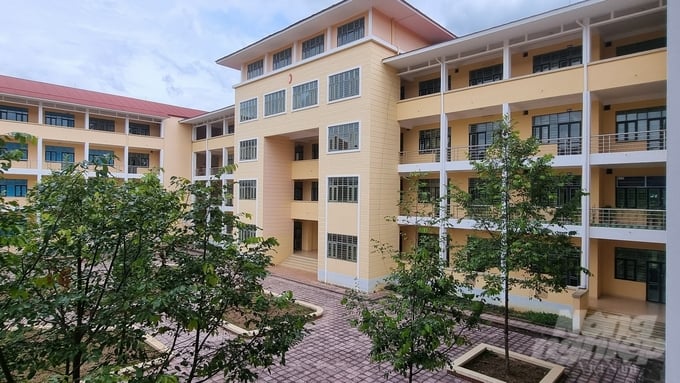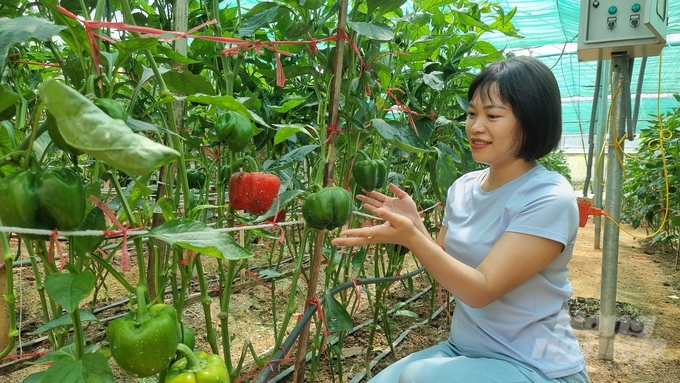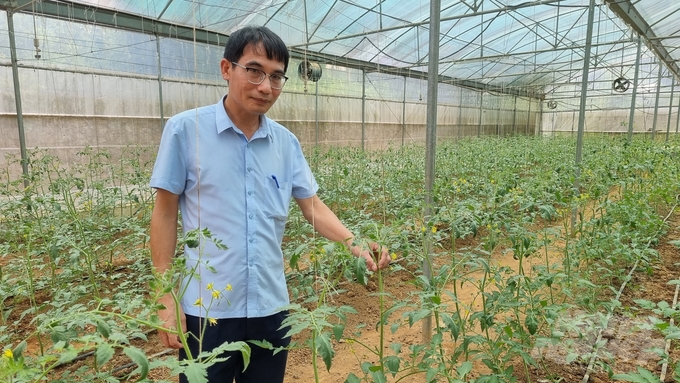November 28, 2025 | 00:15 GMT +7
November 28, 2025 | 00:15 GMT +7
Hotline: 0913.378.918
November 28, 2025 | 00:15 GMT +7
Hotline: 0913.378.918
Tay Bac University was established in 2001 on the foundation of Tay Bac College of Education. This is a public university located in Quyet Tam ward, Son La city, Son La province. With a long history of 63 years of growth, in its "golden age", Tay Bac University not only attracts a large number of students from the Northwest provinces but also students from many other cities in the North in general.
However, in recent years, Tay Bac University has been struggling more and more in terms of enrollment. Even some majors could not open classes because they could not get any students, particularly majors in the Faculty of Agriculture and Forestry.

Making ample preparations for the new school year, but there is no sight of new students at the lecture hall of the Faculty of Agriculture and Forestry, Tay Bac University. Photo: Toan Nguyen.
The Faculty of Agriculture and Forestry of Northwestern University has been enrolling since 2003. It was called the Department of Economics - Agriculture and Forestry back then, with two undergraduate majors: Silviculture and Agronomy. The department added Plant Protection in 2005, Agriculture, Forestry and Economics in 2006, and in 2007 it was renamed the Faculty of Agriculture and Forestry and has operated until now with 6 undergraduate majors: Silviculture, Forest Resource Management, Agronomy, Plant Protection, Animal Husbandry, and Resource and Environment Management.
During its 20-year training history, the Faculty of Agriculture and Forestry has trained 3,050 students. The school year that attracted the most students was the K52 course in 2011 with 321 students, followed by K54 course in 2013 with 317 students, then K56 course in 2015 with 260 students. But from the academic year 2017 - 2018 up to now, all 6 majors of the Faculty of Agriculture and Forestry have fewer students enrolled at an alarming rate.
In the academic year 2019 - 2020, the Faculty of Agriculture and Forestry only enrolled 32 students, and it was 36 students in the academic year 2020 - 2021. In those two periods, Forest Resource Management and Plant Protection were the two majors that failed to recruit any students.
In the past 5 years, even in the most crowded academic year, the Forestry Department of Tay Bac University only recruited 20 students for both Silviculture and Forest Resource Management. Notably, in 2019 and 2020, the Forest Resource Management major could not recruit any students, while the Silviculture major only had 3 students in 2019 and 2 students in 2020.
Nguyen Thi Bich Ngoc, the head teacher of the Department of Forestry (Tay Bac University) says that the department had its own enrollment activities and also participated in the admission programs of the Faculty of Agriculture and Forestry and the University, but was still unable to attract learners.
"Some of the fields of study in the Faculty of Agriculture and Forestry such as animal husbandry, plant protection and cultivation have very bright future in Son La and Northwestern provinces in general. The current market demand asks for a large force of well-trained personnel. Sadly, the number of students studying at Tay Bac University is not much.”

Nguyen Thi Bich Ngoc, the head teacher of the Department of Forestry (Tay Bac University). Photo: Toan Nguyen.
Dr. Vu Quang Giang, Head of the Faculty of Agriculture and Forestry, mentioned some of the reasons for this situation. “Most people in the area are farmers and ethnic minorities with their lives attached to the fields, so students and parents have this psychology of escaping and from agriculture. Besides, the income of the agriculture and forestry industry is basically lower than other industries but demands more labor.”
“People's lives in the Northwest provinces are still full of hardship. Apart from the general support policy for poor, near-poor households and ethnic minorities, students who follow studying agriculture and forestry has no priority. This is also the reason why every year 10 - 15% of students drop out, mostly because their family situation is too difficult, so they cannot continue their studies”.

According to Dr. Vu Quang Giang, Head of the Faculty of Agriculture and Forestry, it is necessary to focus more on career guidance and provide consultation to students about agriculture and forestry during their high school time. Photo: Toan Nguyen.
Dr. Vu Quang Giang offers a number of solutions to attract more people to study agriculture and forestry. The first thing is to have the policy to support a part of tuition fees and studying costs for students, especially those of ethnic minoritíe living in remote areas, having difficult circumstances so that they can have the conditions to attend university and return to develop their homeland.
Next is to increase funding for enrollment and career consultation activities for students right from their high school days so that students can see how their future studies will be, what to do when they graduate, and where they will work.
Translated by Samuel Pham

(VAN) According to Mr. Vo Minh Thanh, Director of the Tay Ninh Department of Agriculture and Environment, Resolution 57 has created a new development pathway for the locality, shifting from traditional toward modern agriculture.
/2025/11/26/4909-2-154329_878.jpg)
(VAN) Pearl grouper farming in HDPE cages not only delivers economic efficiency but also contributes to protecting the environment, creating jobs, and promoting marine-based experiential tourism.

(VAN) The model of making a living under the forest canopy through the agroforestry system in Van Son commune, Bac Ninh province, is expected to generate an annual income of approximately VND 30 million/ha.

(VAN) Many enterprises in Can Tho are harnessing natural energy and reducing greenhouse gas emissions in their production processes, thereby contributing to the promotion of a sustainable green transition.
/2025/11/24/3536-2-112800_176.jpg)
(VAN) Dong Nai now has tens of thousands of hectares of forests certified for sustainable management, and this area will continue to be expanded in the coming period.

(VAN) Vinh Ha hamlet (Dai Xuyen commune, Hanoi) is shifting away from small-scale farming as households adopt bioscurity into their breeder chicken models.

(VAN) Heavy rains make aquatic species more vulnerable to disease. Proactive water management and high-tech systems help farmers prevent outbreaks and protect yields.